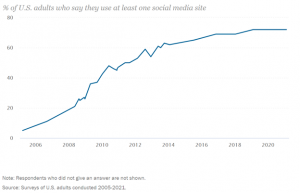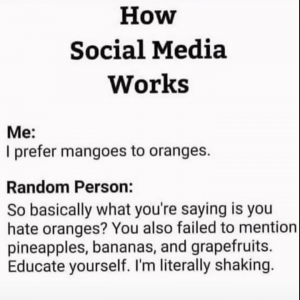A large part of living in the 21st century is having a presence online. That presence often comes with the need to communicate with other individuals, some of whom you may know and some of whom you may not. How do we responsibly communicate with people in today’s online world?
The past decade has seen a huge increase in social media use, with almost 70 percent of adult Americans having at least one social media account now. (Compare that with 15 years ago, when only 5 percent of adult Americans had at a social media site.) Because such a large portion of the population is online, you may interact with a wide variety of demographics, people of all ages, races, backgrounds, and other characteristics; they could be commenting on the same post as you.
Here are five tips for communicating with others online, especially as it comes to agricultural or scientific topics:

1. Be respectful
The nature of online communication can be difficult. There is a sense of anonymity, which can cause people to be more brazen — and thus more rude and disrespectful — when communicating online. Research presented in Psychology Today shows that the lack of eye contact while communicating removes some of the inhibition we may have had to prevent us from saying rude things. In addition, the ability to create a profile that is completely anonymous leads to more possibilities of interacting with “trolls” — the kind of people who are hell bent on creating hostility and conflict just for the sake of combativeness.
It’s critical that we remain respectful in our communication efforts regardless of how others respond to us. This includes our own posts, content we share, and comments we make on others posts.
It can be easy to believe those on the other end are “stupid” or lose your patience, but put yourself in other people’s shoes! Maybe some of these people have never had their viewpoints challenged. Maybe they’ve never gotten to speak with someone in an agricultural- or science-related field. Have empathy, be kind, and realize that a majority of others are in the moveable middle. Kindness builds trust, which is really important.
2. Provide thoughtful responses
The use of social media seemingly has the ability to make some of us slightly dumber. Although social media use is not directly related to changes in intelligence most of the time, it does allow us to be lazier with our intelligence and our exploration of facts. We assume those interacting with us can interpret the meaning behind our comments or the larger idea we are trying to communicate, and therefore we may write short comments without much context. This can also be demonstrated in our favoritism for acronyms, slang terms, and implied abbreviations like utilizing “u” instead of “you.”
Providing more thoughtful responses that clearly and effectively communicate your point will help reduce misinterpretations and hopefully associated negative comments.

3. Convey the appropriate tone
Tone is something we can often indicate by the inflection of our voice, but it is more difficult to illustrate in written language. Misinterpretations of tone can have someone believing that your comment was negative, when it wasn’t your intention.
If someone responds offensively to this perceived tone, it can start a useless argument. Arguments have negative effects on our personal psychology, even simple ones had online. I often try to use emojis ? when communicating to appear more pleasant.
4. Be honest & truthful
Social media has contributed to a rise in the spread of false information, which has impacted many aspects of our lives, especially agriculture. Committing to only communicate the truth is an important part of having a positive online presence. Sarcasm can be the start of spread of false information since tone isn’t well communicated online.

5. Step away
Most social media users report daily use of their accounts, and often a significant portion of the day is spent online now. It’s important to recognize when social media may be having a detrimental effect on your mental health. It can also be easy to get carried away with conversations held online, although these conversations may not have any real meaning or contribution to your day. Learn when it’s best for you to step away.
Michelle Miller, the Farm Babe, is a farmer, public speaker and writer who has worked for years with row crops, beef cattle, and sheep. She believes education is key in bridging the gap between farmers and consumers.



